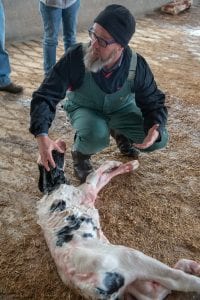Cornell University faculty Dr. Sabine Mann and Dr. Tom Overton are leading a research project titled The effect of season as well as dry period management and nutrition on colostrum quality and quantity. The purpose of this study is to investigate management, nutritional, and metabolic factors that affect colostrum quality/quantity, and thereby successful transfer of passive immunity to calves. This research is supported by the New York Farm Viability Institute.
Samples obtained from animals
The study will have 4 visits over a 12-month period. Study staff plan to lock-up and sample up to 36 adults in the prepartum and postpartum cohort, as well as up to 12 calves 1-7 days of age, per visit. Blood samples will be taken from the tail of adult animals (20 mL) and from the jugular vein of calves (10 mL). Visual body condition scores will be recorded for all adult animals.
No substances will be administered to animals.
Farm Enrollment Criteria
- Ability to collect individual colostrum weight or volume and take a composite sample of colostrum for Brix reading
- Record the weight/volume and Brix reading on individual cow’s colostrum (Misco Brix refractometer and record binder will be given to the farm)
- Minimum of approximately 500 with preference of 1,000+ lactating cows
- Headlocks in pre-fresh and fresh pen
Other Study Activities
- Complete a herd questionnaire describing dry cow management, calving practices, and colostrum management.
- Allow study personnel to visit your farm four times to obtain animal samples as specified above, feed samples, body condition score enrolled animals, and retrieve rations, feed mixes, and records.
- Allow us to access DC305 records.
- Allow us to contact your nutritionist to inquire about formulated rations for dry and fresh cows.
- Allow us to hang two small environmental sensors to collect environmental temperature, relative humidity, and light.
- Share data on dry matter intake in dry cow/heifer and fresh cow/heifer pens.
- Allow digital pictures to be taken and used in anonymized form.
Results
Data will undergo statistical analysis to make general as well as farm specific recommendations to be shared with participating farms on improving colostrum quality and quantity. Study results anonymized from participating farms will be published in popular press articles, peer-reviewed journals and will be presented at national conferences. Visit BHB results can be shared with producer shortly after visit.
If Interested
If interested, please contact Trent Westhoff at taw96@cornell.edu or inform Betsy Hicks, Margaret Quaassdorff, Charlene Ryan, Casey Havekes, Tom Overton, or Sabine Mann. Farm enrollment begins October 1, 2019 and will continue until 21 herds are enrolled.

